#Marx K.
Explore tagged Tumblr posts
Text
Come erravamo - 7

La volontà del capitalista consiste certamente nel prendere quanto più è possibile. Ciò che noi dobbiamo fare non è di parlare della sua volontà, ma di indagare la sua forza, i limiti di questa forza e il carattere di questi limiti.
K. Marx, [Value, Price and Profit, 1865], Salario, Prezzo e Profitto, Roma, Editori Riuniti, 2024 [Trad. Palmiro Togliatti]
Copertina: Per quanto abbia cercato, nella mio elettrolibro non ho trovato riferimenti all'immagine di copertina. Mi sembra strano che non abbiano attribuito il disegno con una chiara indicazione di chi fece quel lavoro… Rimedio io, almeno per questo post: l'immagine è stata tratta dal fumetto Bringing Up Father (Alcibaldo e Petronilla), disegnato a partire del 1913 dallo statunitense George McManus.
Arcibaldo: Sono diventato ricco col duro lavoro Operaio: Ma di chi?
21 notes
·
View notes
Text
I'm being so serious when I say these frames are the funniest thing I've seen in my fucking life


Its literally perfect.
1.Her uniform not matching and having been reused from the time her boss tried to start a maid cafe
2.The hollow starving look in her eyes (she literally adores food and money in the same way) (Homegirl is already down to eat the rich ig)
3.The way they quietly escort her away from Saiko. Chances are he didn't even notice that she was there (no way that kid observes the help.)
4.The way none of her friends notice her literally being dragged away by security.
5. The fact that Saiki actually did notice did notice and Could Not Care Less.
#saiki k#anime#mera chisato#She might be the only character I've actually ever kinned#Karl Marx would have loved her (as a case study)#saiko metori#As someone who works at a country club I get it. Working for the rich has its pros
182 notes
·
View notes
Text

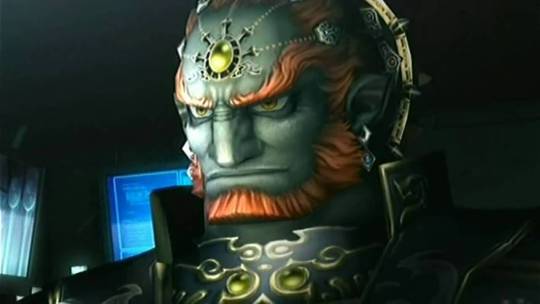
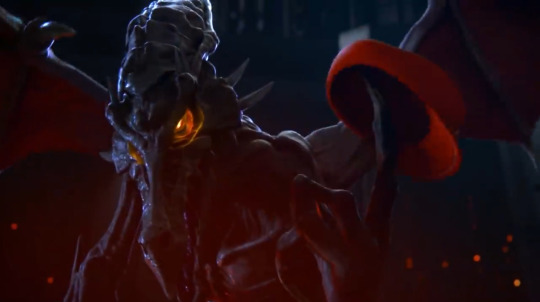


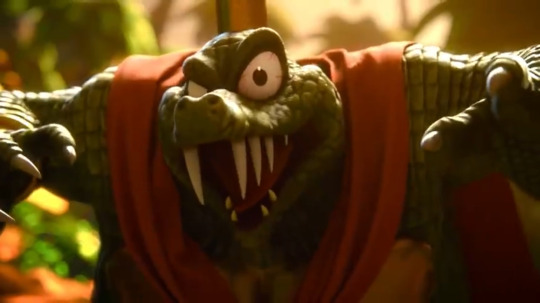

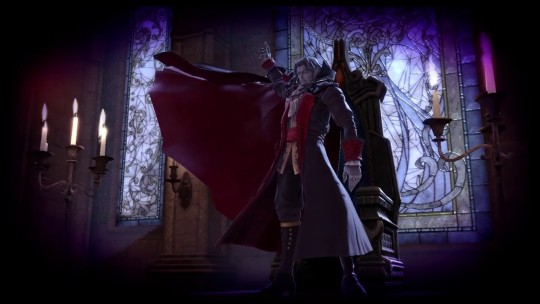

The Major Villains of Smash Bros.
#ganondorf#ganon#bowser#ridley#wolf o'donell#bowser jr#ludwig von koopa#roy koopa#wendy koopa#iggy koopa#morton koopa jr#larry koopa#lemmy koopa#the koopalings#king k rool#sephiroth#marx#dracula#vlad dracula tepes#super smash bros#the legend of zelda#legend of zelda#final fantasy#final fantasy vii#ff7#super mario bros#metroid#donkey kong#kirby#castlevania
73 notes
·
View notes
Note
What flavour of communist and/or gay are you? /Gen
I'm not really sure what this means.
Not to spout clichés or take myself too seriously, but to some extent I think labels confine us within rigid structures which ultimately only serve our enemies. I know it's just a shortcut, but even the fact that you say 'flavour' kinda reiterates the idea that lots of the associated terminology positions us as existing for consumption.
Of course I know language matters. Indeed, I think a disproportionately large amount of leftist in-fighting is down to word choice and communication. More often than not, when anarchists refer to the state and Leninists refer to capital or bourgeois democracy, we're all talking about the same systems of harm and oppression. I also believe that what's most important is what we do, not how we identify.
I actively avoid the 'discourse' surrounding queer terminology. For years in my youth I railed against the word 'bisexual' because I didn't like that it implied I have two distinct sexualities, and for awhile I even called myself 'ambisexual' in an attempt to prompt a deconstruction thereof. But then I decided that I like the colours of the bi flag, which is really all that matters, because it's just aesthetics.
So I guess let me put it this way: I'm a trade union organiser who specifically represents queer union members. I grew up reading Marx, and some of the greatest influences through my adolescence on how I approach the world were Gramsci and Mao, and later Fanon and Butler. I spent a lot of my twenties questioning whether I count as trans, as I have always been very comfortable with both my masculinity and my femininity, but at some point I realised very clearly that the gender I was assigned at birth is not reflected in either.
I very strongly believe in the value of Lenin and Leninism to global struggle; but likewise I have taken a lot from Malatesta, Luxemburg, Adorno, and so on. I also think, while they are to be scrutinised rigorously, there is much to be gained from the likes of Trotsky, Foucault, or Žižek. I am a staunch anti-Zionist, but Memmi nevertheless teaches us a great deal about the plight of the colonised.
I am probably closer to an orthodox Marxist than I am to a Leninist or anarchist, but ultimately I think all this orthodoxy reeks of bourgeois affectation. The questions we should be asking are: who is most impacted by the realities of a given situation, and what are they saying, what do they need? Once upon a time in the west, and certainly still in most cases, this is BIPOC and sexual others, so we read Davis and Feinberg and Öcalan and Ahmed and Tuck and Yang. It is the strength of the revolutionary to adapt to the material conditions at hand, and remain undaunted.
In the end, we have more in common with one another than we have with ruling classes, right? So let us gather together! If this is the final struggle, let each stand in our place.
#Marxism#Antonio Gramsci#Lenin#Judith Butler#Rosa Luxemburg#Angela Davis#Leslie Feinberg#Sara Ahmed#Tuck & Yang#Marx#Karl Marx#V.I. Lenin#Mao Zedong#Mao Tse-Tung#Theodor Adorno#Errico Malatesta#Albert Memmi#Abdullah Öcalan#Eve Tuck#K. Wayne Yang#original#communism#communist#Frantz Fanon#ask
97 notes
·
View notes
Text
i'm stuck in my sci fi novel so i just, started reading marx's capital :/
#becoming the most insufferable guy you know summer spring going well#my reading list is like: marx. berserk. philip k. dick. im sorry#the diary#anyway it will be really funny if people get to read this someday and they're like 'you read all this theory for a fun caper about grief#and gay sex???????' well yeah
28 notes
·
View notes
Text
Books for political formation
Books that have left an indelible mark on my understanding of politics some way. My political development is unfinished, so this list is unfinished - I'm always open to suggestions
Capital Vol. 1, Karl Marx - unmasks the inherently exploitative social relations embedded within capitalism, critiques capitalism as ineffective/self-destructive (not just immoral)
Capital and Ideology, Thomas Piketty - there is no such thing as a "natural" social order, examines how inequality regimes have emerged and been justified across the world throughout the past 1000 years of history
Nixon Agonistes, Garry Wills - captures a cross-section of American politics over a short period, probing insights into the psychology driving political affinities, documents the evolution of the word "liberal" in American political discourse
What Are We Doing Here?, Marilynne Robinson - provides a constructive, anti-Hobbesian view of society
Poverty, by America, Matthew Desmond - shows the extent to which poverty in America is a policy choice, harm reduction is possible without revolution
The Code of Capital, Katharina Pistor - a cursory overview of the legal strategies to insulate capital from any competing legal claims
Eichmann in Jerusalem, Hannah Arendt - laziness and insistence on self-exoneration is often the psychological engine behind human wickedness and injustice over and above malice
Illness as Metaphor / AIDS and Its Metaphors, Susan Sontag - shows how deeply ingrained prejudicial views of disability is within our collective language and psyche
Blood Meridian, or, the Evening Redness in the West, Cormac McCarthy - violence has never been excised from politics, the invisibility of violence to the bourgeois is an illusion
Lysistrata, Aristophanes - unmasks the nature of gender politics despite its operation behind closed doors, imagines a project of mass organizing along gender lines
Civilization and Its Discontents, Sigmund Freud - civility is unfortunately a tenuous prospect
Heroes of the Fourth Turning, Will Arbery - excoriates conservative psychological pathologies
Martin Luther King Jr
A Gift of Love - justice is love in public
Letter From a Birmingham Jail - there are contexts where civil disobedience is mandatory for the Christian, solidarity with the marginalized is always mandatory
The Waste Land, T.S. Eliot - progress is not inevitable
William Faulkner
Absalom, Absalom! - racism is an inexorable part of American capitalism, imperialism cannot be stopped until we are able to free ourselves of our disingenuous national myths
The Sound and the Fury - nostalgia makes you an idiot, unable to understand your present or to predict your future
Herman Melville
Billy Budd, Sailor - history is unavoidably malleable
Moby-Dick - a true-believer demagogue is worse than a cynically disingenuous one, democracy can be an ineffective antidote to a tyrant
Franz Kafka
The Trial - the very procedures instilled to protect (or at least mitigate) injustice can also exacerbate it
The Metamorphosis - modernity interferes with our ability to see and relate to others as human, liberalism's self-advocating and individualistic ethic destroys us from the inside out because it forecloses our ability to recognize this
John Milton
Areopagitica - freedom of speech is as much about the individual's freedom to render judgment on speech as it is about the speakers ability to speak, the problem with censorship is the top-down nature of it, not in the governed people's discernment of quality or value
Paradise Lost - similar to Birmingham Jail, the character of Abdiel represents righteous opposition to Earthly principalities
The Autobiography of Malcolm X - the psychological, spiritual, emotional toll that being black in America takes on a person, black empowerment is a necessary step towards black liberation
Ursula LeGuin
The Lathe of Heaven - structural reform can only be undertaken democratically, no change is without trade-offs so changes must be broadly accepted and supported by the populace who will inevitably bear the unforeseen burden that results
The Ones Who Walk Away From the Omelas - shows the extent to which our brains are broken by imperialistic thinking, exploitation is a necessary feature of the worlds we are capable of imagining
#karl marx#thomas piketty#garry wills#marilynne robinson#matthew desmond#katharina pistor#hannah arendt#susan sontag#cormac mccarthy#aristophanes#will arbery#martin luther king jr#t.s. eliot#william faulkner#herman melville#virginia woolf#franz kafka#john milton#malcolm x#ursula k. le guin
6 notes
·
View notes
Text
dünyanın hiçliği, tutunabilecek hiçbir şey ve dayanabilecek, emin olunabilecek herhangi bir sağlam "sebep" sunmaz. dünya nedensizdir: "başın üstünde herhangi bir çatı, ayakların altında herhangi bir zemin yoktur." "bir anda engin gökyüzü yıkılır. kutsal olan, dünyevi olan, iz bırakmadan ortadan kaybolur. yol, ayak basılmamış yerde son bulur.
byung -chul han - zen proverb
#byung chul han#zen proverb#buddha#buddhist#lao tzu#taoism#tao te ching#ursula k. le guin#mülksüzler#charles bukowski#kitap#edebiyat#blogger#felsefe#kitaplar#blog#kitap kurdu#felsefe blog#karl marx#friedrich nietzsche#georg wilhelm friedrich hegel#faust#franz kafka#john berger#bertolt brecht#platon#sokrates#aristoteles#antik yunan#eckhart tolle
8 notes
·
View notes
Text
Rich people who are not in fandom be living the most different lives like how does it feel not having internet lingo and habits ingrained in you
#you cannot pry the emojis 😭💀 out of my cold dead hands#how does it feel not being burdened by emz or chz or HUY#how does it feel knowing that you type in lowercase and make ultra niche jokes#interacting with them is the most isolating feeling ever#like we have the same humour but you do not see it the way i do#i do not see it the way you do#it's an uncanny feeling#typing this as the soul of karl marx inhabits my body /j#like all of my mutuals are the same as me but then i cant tweet because one person follows me WHAT THE HELL#how do i go back to my regularly scheduled program on there istg#// maple#ano nga pala feeling na hindi magets twt humour kasi hindi ka naman nakadepende sa mga aus dahil may jowa k 😭
1 note
·
View note
Text
Bourgeois revolutions, like those of the eighteenth century, storm more swiftly from success to success, their dramatic effects outdo each other, men and things seem set in sparkling diamonds, ecstasy is the order of the day—but they are short-lived, soon they have reached their zenith, and society has to undergo a long period of regret before it learns to assimilate the results of its storm-and-stress period soberly. On the other hand, proletarian revolutions, like those of the nineteenth century, constantly criticise themselves, constantly interrupt themselves in their own course, return to the apparently accomplished, in order to begin anew; they deride with cruel thoroughness the half-measures, weaknesses, and paltriness of their first attempts, seem to throw down their opponents only so the latter may draw new strength from the earth and rise before them again more gigantic than ever, recoil constantly from the indefinite colossalness of their own goals—until a situation is created which makes all turning back impossible, and the conditions themselves call out: Hic Rhodus, hic salta! Hier ist die Rose, hier tanze!—Here is Rhodes, leap here! Here is the rose, dance here!
Karl Marx, The Eighteenth Brumaire of Louis Bonaparte, trans. Saul K. Padover
339 notes
·
View notes
Text
Criminali, brava gente
Un filosofo produce idee, un poeta poesie, un pastore prediche, un professore compendi, ecc. Un delinquente produce delitti. Se si considera più da vicino la connessione esistente fra questa ultima branca di produzione e l’insieme della società, si abbandoneranno molti pregiudizi. Il criminale non solo produce crimini, ma anche il diritto penale e quindi anche il professore che tiene cattedra di diritto penale e l’inevitabile manuale in cui questo stesso professore getta sul mercato generale i suoi contributi come 'merce’. Ciò provoca un aumento di ricchezza nazionale senza contare il piacere personale che... la composizione del manuale procura al suo autore. Il criminale produce inoltre tutta l’organizzazione poliziesca e la giustizia penale, gli sbirri, i giudici, i boia, i giurati ecc. e tutte quelle differenti professioni che formano altrettante categorie nella divisione sociale del lavoro, sviluppano facoltà dello spirito umano, creano nuovi bisogni e nuove maniere di soddisfarli (...). Mentre il delitto sottrae una parte della eccessiva popolazione al mercato del lavoro..., la lotta contro il delitto assorbe un’altra parte della stessa popolazione. Il crimine appare così come uno di quei fattori naturali di equilibrio, che stabiliscono un giusto livello e aprono tutta una prospettiva di 'utili occupazioni’.
Il brano è tratto da uno scritto da Karl Marx ed è solitamente aggiunto alla "Teoria del plusvalore" nel quarto volume de Il Capitale.
Citato da:
O. Ottieri, L’irrealtà quotidiana [1966], Parma. Guanda, 2004
17 notes
·
View notes
Text
Queens of the fuck ass job
I've never felt more seen

No one else has ever done so much for so little. Minimum wage baddie representation at it's finest.
#saiki k#austin and ally#anime#disney#minimum wage#karl marx would have loved them#highschoolers are seen as acceptable for corporations to exploit for labor and are seen as not deserving true wages#mera chisato#trish de la rosa
21 notes
·
View notes
Text
Russian State Library
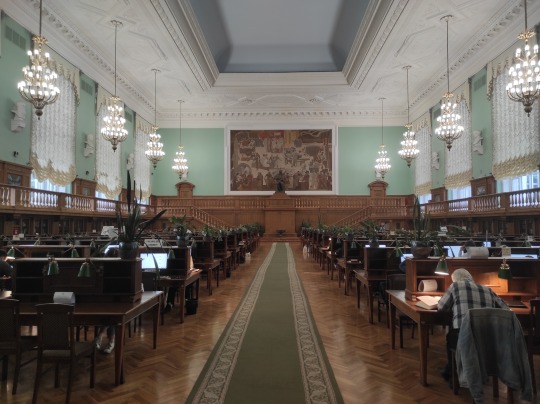
The biggest library in Russia and one of the biggest in the world. It was designed in late 1920s, soon after the birth of the new Soviet state, and fully finished in the 1950s. In includes 4 buildings and one 19-floor book repository. There are several reading halls, a cafe, and a whole bunch of book-filled nooks and crannies.
I'm writing this post sitting in the library's biggest reading hall - Reading Hall No. 3. It was opened in 1957 and still retains most of the original furniture and design (only there are now individual power sockets in every desk). Most of the tables are occupied by people with books and laptops. It's very quiet.
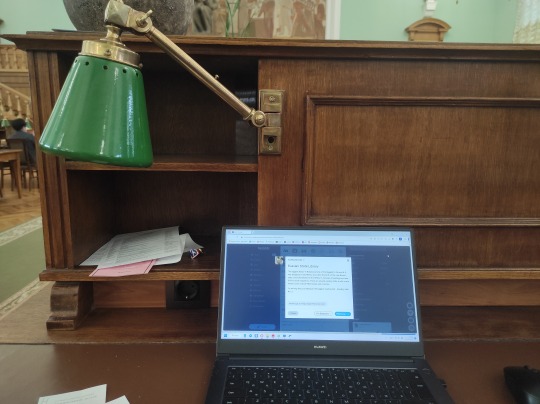
The book depository is a huge building that rises high above everything else in this historical area. It had 10 floors originally, each 5m high, but later it was divided into 19 smaller floors. We visited one of the floors. I was impressed to see that the windows are made out of Falconnier glass blocks (made specially for the library in Gus Khrustalny).
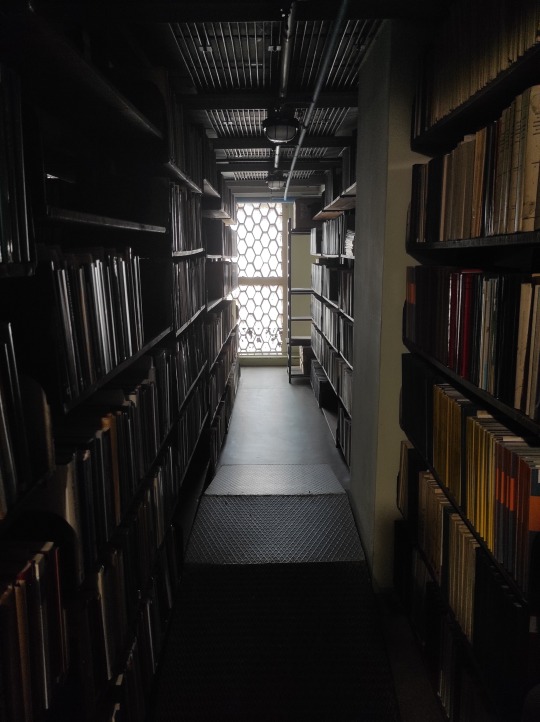
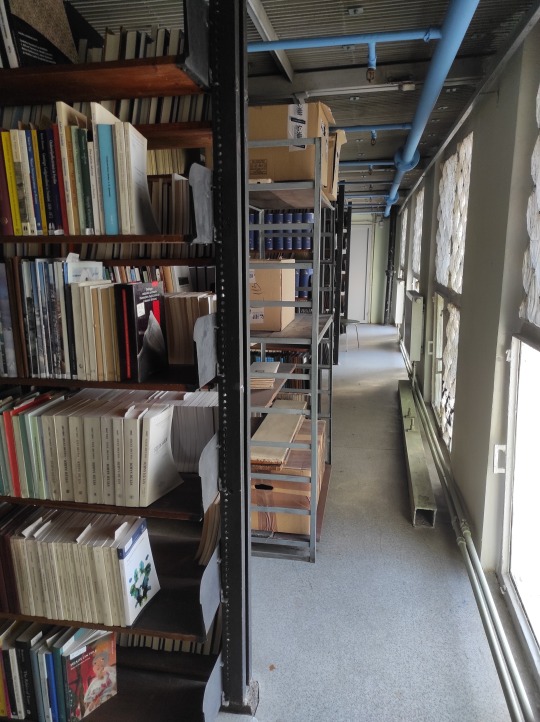
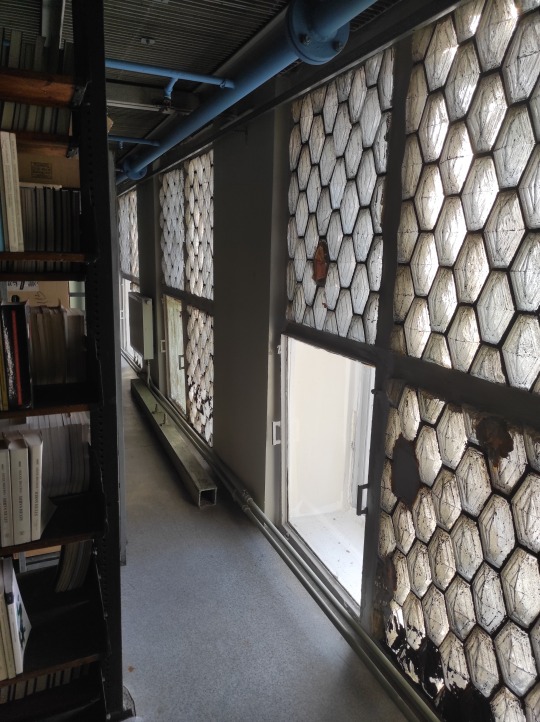
There are two automated delivery systems in the library: one delivers readers' orders into the depository (pneumatic tubes) and the other delivers books back to the reader (monorail). We had a chance to see both of them in action, very impressive! They also kept a bit of the old book delivery system that worked from 1953 until 2015. I saw it on pictures before, and it was great to see the granny in real life. :) There are a lot of "grannies" in the library, from the green lamps to rotary phones to wall clocks. The pneumatic tube system has been in place since 1975. People whose job is to preserve books are very likely to preserve everything else.
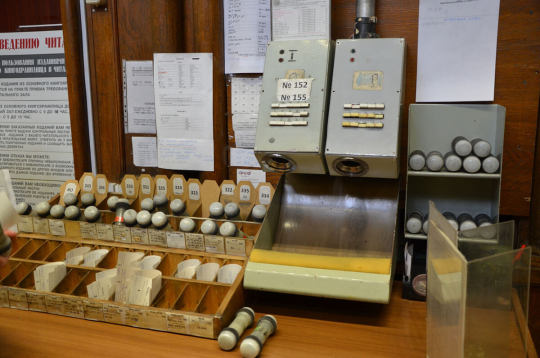



I loved this anecdote. In one of the reading halls, there's a big painting of Lenin (pictured below). Apparently it was put in place in mid-1950s to cover the bas-relief that was there originally. On the bas-relief there are Karl Marx, Friedrich Engels, Vladimir Lenin and Joseph Stalin. After Stalin's death in 1953 and debunking the cult of personality, images of him were quickly removed from everywhere. The library, being true preservers of history, kept theirs but covered it up. It just shows what kind of people librarians are. :)
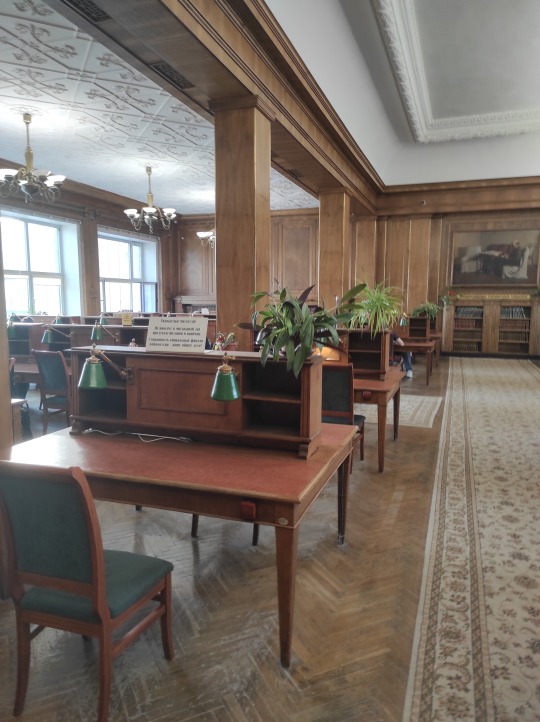
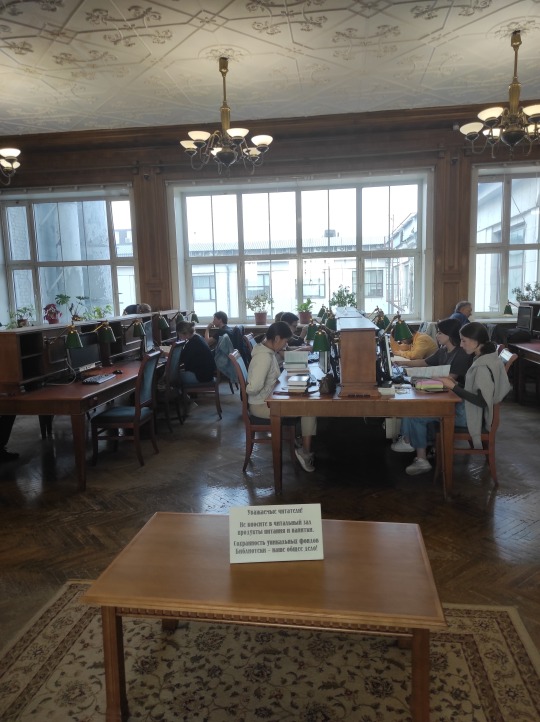
Although the library is working on running a full digital catalogue of all their 48 million items, if you want access to older editions you'll probably need to use the old paper card catalogue. The room gave me major nostalgy - I remember using this kind of catalogue in my local library when I was a kid. The sound of pulling out a narrow box, then the little built-in table, going through the cards one by one, writing down what you need on library cards. It was a whole process! Of course, the local library's catalogue was WAY smaller.
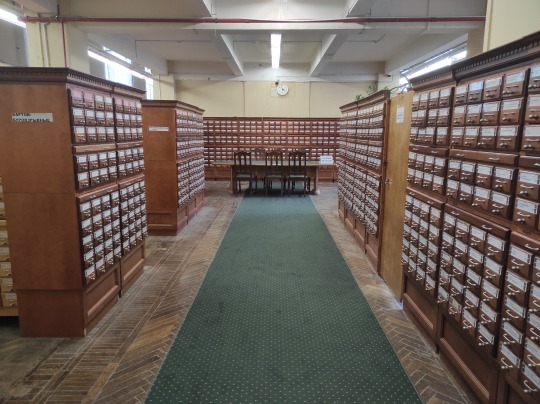
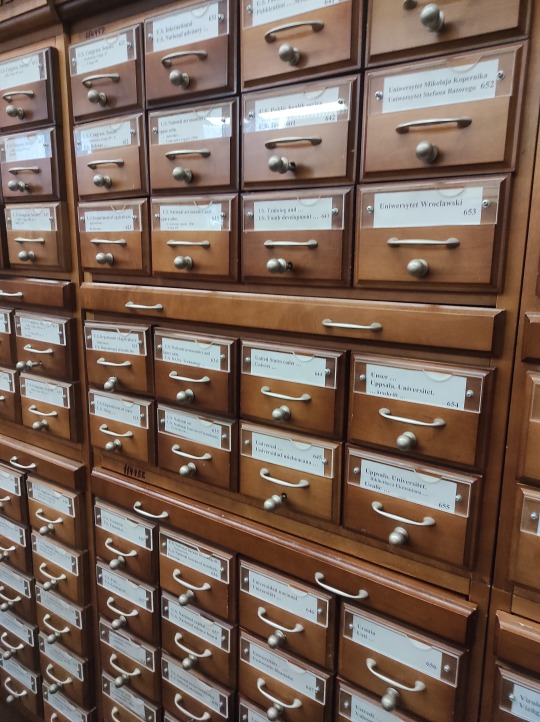
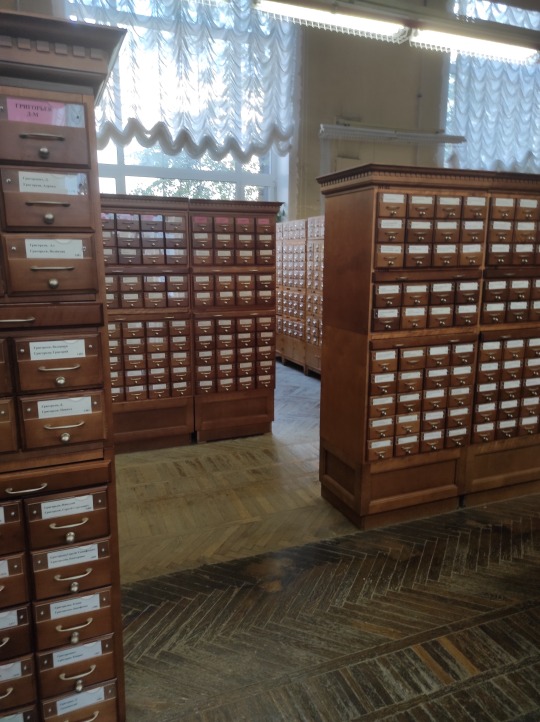
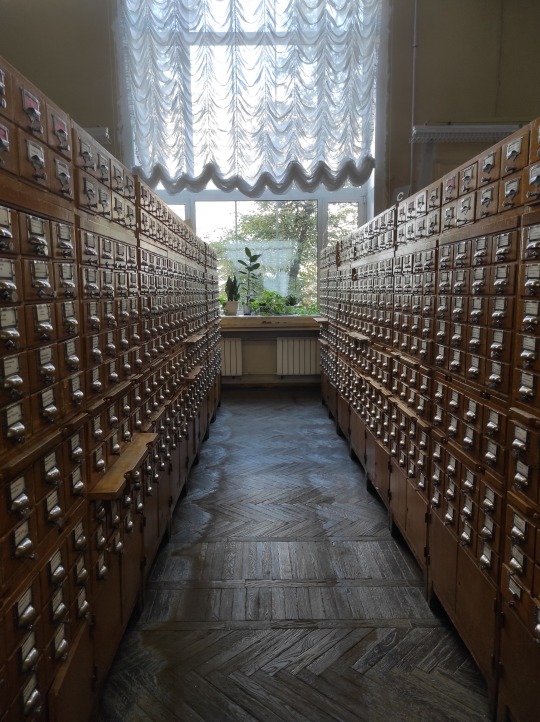
A few more shots of interiors. Although the building itself was designed in 1920s (during the era of avantgarde and art deco), the interiors were mostly done in 1950s when the main design style was neo classicism.
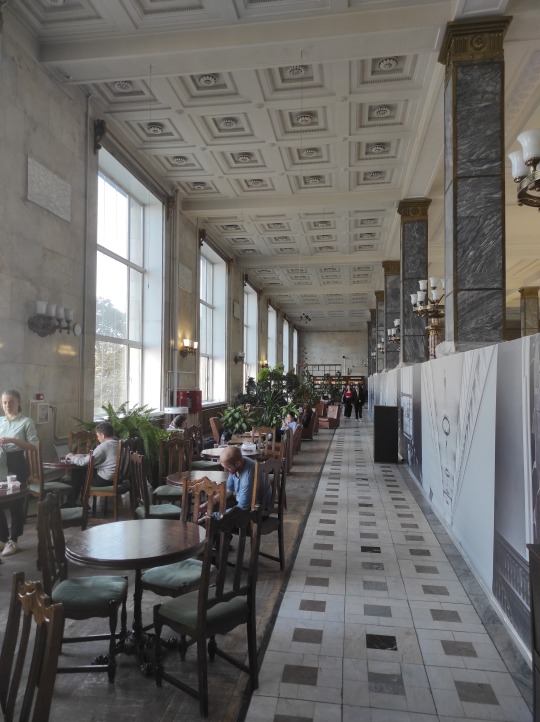
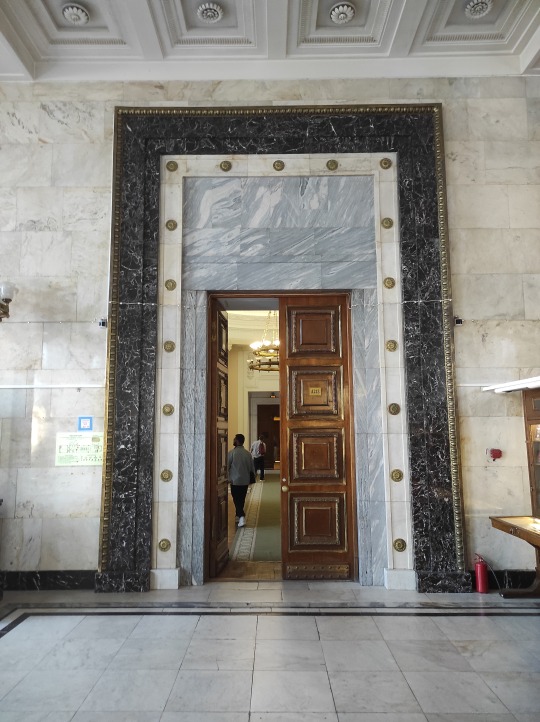

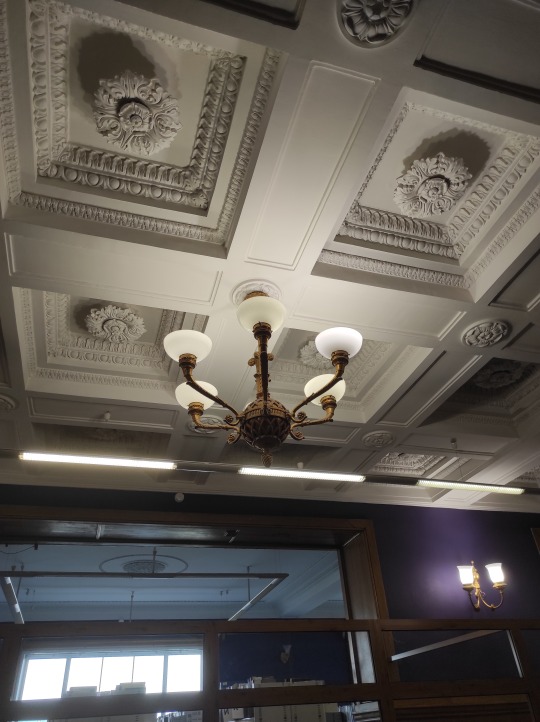
I enjoyed this tour immensely, so much so that I had to go back and get a library card so I can see more of it, sit in every reading hall and drink a cup of tea in the marble hall cafeteria. Also, the idea of 48 million books at the tip of my fingers makes me giddy. Thank you to my followers for the monetary support and making this real for me: K. T., H. W., T. B., m., @depetium, @transarkadydzyubin, S. R.
769 notes
·
View notes
Text
Advice for Turtle Islanders
Hey everyone, I’m aware that I’m very privileged to live in a country where the government are like, regular level shit instead of Trumpian, so I wanted to help out people living in the so-called USA however I could. Here’s my advice for what it’s worth - I don’t have experience living under an authoritarian state but I have studied history and been paying attention to what everyone has been saying in the past few weeks, so I thought I’d offer some of my suggestions for how to keep yourselves and your neighbours safe going forward. It’s hard to know what to go so far as to suggest, since it’s just so unpredictable what might happen over the next few years. But in the interests of predicting every eventuality, I hope you’ll overlook any particularly outlandish suggestions. Hopefully it won’t get as far as some of these actions imply, but it’s always better to be prepared than blindsided. You don’t have to do all these things. Just do what you can, and remember you aren’t alone
-Join a labour union, go to meetings, and be prepared to strike
-Attend protests even if you think they won’t do anything. But bear in mind you will increasingly risk arrest and police brutality. Dress unremarkably, don’t take photos at protests and DEFINITELY don’t share them online
-Call your senators, congresspeople, governors, state legislators, mayors and city councillors. Continually bother them and kick up a fuss about even the smallest thing you disagree with. It’s important to keep government busy so implementing evil legislation is harder
-Set up or volunteer with a community fridge/kitchen or homeless shelter
-Knock on your neighbours’ doors and start getting to know them. If they are safe people, build relationships of reciprocity and care with them
-Read. Expose yourself to as many ideas as you can, but especially political theory, queer storylines and other subversive texts. Some recommendations:
Hope in The Dark by Rebecca Solnit
The Dispossessed by Ursula K Le Guin
How to Stand Up to a Dictator by Maria Ressa
Anything by Marx, Kropotkin, Chomsky, Gelderloos, Freire, Fanon, Foucault, Harvey, Graeber, etc
Braiding Sweetgrass by Robin Wall Kimmerer
The Faggots and their Friends Between Revolutions by Larry Mitchell
Pirate Care by Marcell Mars, Valeria Graziano and Tomislav Medak
No Ordinary Men by Elisabeth Sifton and Fritz Stern
Conspiracy of Decency by Emmy E. Werner
-Try to set up or join a local group in your community that discusses political or philosophical ideas, does consciousness-raising, builds connections between neighbours, provides stopgap services to desperate people, teaches people their legal rights, or some equivalent act of mutual aid or resistance
-Key in to existing activist networks for climate, racial, migrant or gender justice - attend their events, fund them, give your time
-Consider whether at some point you’d be willing to do things the government will tell you are forbidden, risking arrest, imprisonment and possibly more severe consequences further down the line. You will have to answer to your own conscience but it’s also important to try and keep safe. If you’re willing to hide people from ICE or the police, source ‘illegal’ HRT and other essential medication, lose or falsify records, help someone get reproductive care, spread forbidden ideas, graffiti or poster government buildings, hold sit-ins, occupations or encampments, key certain people’s cars, let people in or out at borders who you aren’t ‘supposed’ to, sabotage fossil fuel or military infrastructure, disrupt party conventions, withhold tax, film or take photos in places where it’s banned, conscientiously object should a draft come in, or other similar behaviours, do them quietly and carefully. Involve as few other people as possible and DO NOT in the coming days broadcast your willingness to do so. Also for legal reasons I’m joking 😉
-Pick a behaviour from the government which, if enacted, would result in you immediately leaving the country. Once they do this, get OUT. Don’t make it too small, but don’t wait until they’re rounding up journalists in the street, holding public executions or imposing military curfews either. (I’m not saying any of these things will happen, I’m just saying pick your line.) If you’re trans, this event might have already happened, in which case start the process of seeking work or asylum abroad. Do your due diligence - make sure the place you choose will be safe for people like you, and bear in mind that asylum seeking is a big step that will expose you to dehumanising bureaucracies and local hostility even in the most liberal countries
-Put together a go-bag
-Donate any money you can spare either to these advocacy groups or to people in need directly
-Be radically, aggressively kind and compassionate to everyone you meet
-If you have children or are responsible for them, talk to them about what is happening. Strike a balance between explaining to them that it’s important to stay true to our principles and making sure they know to be careful
-Take time to be with loved ones and experience moments of joy, whether this is group meals, days out, shared catharsis, birthdays, religious celebrations, making music, movie nights, whatever replenishes you and reminds you what the fight is for
-Pick an hour each day in which to engage with and respond to the news (broadcast channels, papers, social media). The rest of the time focus on your well-being, that of your family, friends and neighbours, on your job, on being kind, on your volunteering, on resisting in countless tiny ways. Unless something big and emergent is happening in which case respond and react in real time
-Seek out good news stories from your own country and the world. They are out there, I promise
-If you see an arrest or immigration raid, get your phone out and start filming. You have a right to record it
-Donate to bail and strike funds
-Spend time in nature, and learn the names of local trees, flowers, birds, mammals, fish and reptiles. Educate yourself about the natural history and ecology of your local area so you can replenish your mental health, defend your environment and remember that there is life beyond the fascist state’s delusions of total control
-Learn about and engage with your local indigenous tribes. Study their history, attend any events they put on that are open to the settler public, donate money and any supplies they might need, agitate for their rights, see if you have any land you could transfer to their stewardship, and learn some of their languages if they think that’s appropriate
-Make an effort to research and understand things that are happening abroad. The US empire thrives on isolationism, ignorance and poor education. Learn foreign languages, follow other countries’ politics, study their history, watch their films, expose yourself to their cultures and teach yourself to point them out on a map. The more you feel affinity with people across the globe, the more you are a citizen of the world and able to keep your heart safe from narratives of exceptionalism - because you’d best believe the propaganda will be targeting you too. You’re not immune to it. You have to work at resisting. Foreign news services can also help you keep a handle on what’s real if your national ones are lying to you
-Run for school board, union rep, a welfare or campaigning role on your college campus or in your place of worship, or some other small-scale local post where you can make a difference
-If you’re in a position to do so, see if you can help marginalised people receive cheaper services through your job, volunteering or advocacy (for instance offering discounted rates if you run your own business)
-Learn first aid, cooking, and basic clothing repair, and teach these skills to others. Use them to help people with relevant needs
-Pick your battles. Sometimes you might have to let smaller things slide in order to make a bigger difference later. Other times, the small things will be the thin end of the wedge and you’ll want or need to take a stand
-Wear a mask and try to keep up to date with your vaccinations
-Be ready to mobilise your community to protect vulnerable people or places from vigilante attacks, especially if there’s a mosque, immigration centre, lgbt venue or abortion clinic in your neighbourhood
-Download the Signal app and Element software. Get a VPN. Turn off ‘learn from this app’ in your phone’s Siri settings for every app. Leave your phone at home if you’re protesting or doing anything else spiky. Put it in the fridge or at the other end of the house if discussing things you don’t want overheard. Assume you are under surveillance most of the time
-Carry narcan
-Get a library card and take out as many books and DVDs there as you can, use the internet there, stay warm there, really make use of the public service. You can even offer to volunteer there if you have time
-See if you can access academic and scientific papers somehow, and make an effort to read at least one over a semi-regular period of time. This will help with the education mentioned above, as well as keeping you in touch with the truths which your government is so eager to suppress. Lots of downloads also helps an academic in their career, which will be very valuable now that so much of their funding has been cut
-Pick up your neighbours’ groceries or prescriptions for them, drop them off at/pick them up from medical appointments, watch their kids, bail them out and cook for them
-Quit twitter. Use BlueSky instead if you want but don’t assume you are unobserved there. Consider quitting Facebook and Instagram too if you can - Supernova offers a vaguely similar user interface to insta if you want to keep up with friends and continue sharing pictures
-It might help your sanity to start keeping a diary or journal, detailing your emotions and experiences and keeping an eyewitness record of your government’s behaviour. If you do this, though, consider keeping it in a secure hiding place or writing it in code. Perhaps send a copy securely to someone outside the country, but only if you can do so safely, and be ready to destroy it if you think you’re in danger from its discovery
-See if you can get involved with or start a movement for community green energy in your local area
-If you have any garden space, try to plant and grow a bit of your own fruit and veg
-Get trained in non-violent direct action and in self-defence
-Save as much money as you can. You never know when you or someone else might need it
-If it’s accessible to you, consider getting a therapist to talk through the difficult experiences and painful emotions that are going to come up in the next few years. But be careful - make sure you trust the professional you use and that your conversations are as private as possible. Even if both of these are the case, be considered as to how you phrase things
-Walk, cycle, or take public transit whenever possible
-Make art! Paint, draw, sing, play instruments, write stories or poetry or lyrics or plays, act, dance, collage, sculpt, whatever frees your heart and keeps it your own
-Donate individually or through orgs to sex workers, domestic violence survivors, Romani and Traveller individuals, and other people at risk of precarious housing and/or income
-Educate yourself about Islam, Judaism, Hinduism, Sikhism, Buddhism, Jainism, Zoroastrianism, Paganism, Indigenous Spiritualities and other non-Christian religions
-Carry a spare scarf to offer to a hijabi whose hijab might be torn off by vigilantes
-Offer court support to friends and neighbours
-While you still can, source and distribute as many binders, packers, breast forms and pairs of tucking underwear as possible
-As much as possible shop with small local independent businesses, and follow consumer boycotts
-Consider eating less meat. Ignoring the environmental and ethical implications of the meat industry, deregulation is likely and this means many food safety standards will be scrapped
-If you can afford it, get an air filter for your house and a water filter for your tap
-See if you can file lawsuits against government bodies or big companies for violating various laws and rights
-Make sure the disabled people in your community can access spaces, services and transit, that they have enough money for necessities and for disability aids, and that there’s an evacuation plan for them in the event of flooding/fires/a tornado/vigilante violence/government violence
Stay safe out there everyone. Look after each other, keep your head high and your heart soft, and survive.
#hopepunk#solarpunk#cottagepunk#environmentalism#social justice#bright future#optimism#community#tidalpunk#climate justice#usa#America#turtle island#trump#resistance#defiance#us politics
40 notes
·
View notes
Text
The Witcher Headcanon - Drunk: Bonus Scene - Part 1
"Maybe you should slow down with the drinking," Geralt suggested as he watched Jaskier from across their campfire.
The bard responded to this bit of unwelcome wisdom with an irritable snort. He was trying to get some work done on a song, but it was hard to hear the lyrics in his head when Geralt kept talking!
The ar**hole had been b*tching at him about him drinking every time they stopped in a town!
Jaskier shot Geralt an angry glare and snapped, "Ye aren't gettin' f***ed, so stop wiggling yer a**!"
Geralt blinked as his brain took a few seconds to tanslate the phrase from "Jaskier", to "Geralt".
"Mind your own f***ing business!"
Geralt frowned at the reaction. It wasn't like Jaskier at all. In fact, the bard had not been acting like himself for the past two weeks or so.
For starters, he seemed to be perpetually slightly drunk. Jaskier had been celebrating a little too liberally with his fans after his sets. He was doing round after round of drinks, and Geralt was having to carry him to their room.
When the subject was brought up, Jaskier brushed it off. "I'm just mingling with the people, Geralt! They love it! And besides, why can't I enjoy some of the finer, more fun things in life? Good booze is good booze!
Geralt had rumbled, "It's not fun when you drink so much you can't walk! Or when you're not even over the previous hangover before you're drinking again!"
"Oh, hush! You're making something out of nothing!"
"Yeah, nothing," Geralt responded sarcastically, "'Nothing' like when you almost got killed by Nekkers because you were 'just a LiTtLe BiT dRuNk!'?. Or how you almost got us arrested for public indecency at the inn in the last town because you started a fight with a man twice your size?"
"Oh, stop exaggerating! Bar fights aren't grounds for being charged with public indecency!"
"You were hanging bare a** naked off the guy's back, swearing like a sailor, while punching him in the back of the head AND trying to f**k him in the a** AT THE SAME TIME!"
Jaskier had the audacity to laugh. "That's utter bullsh*t!"
Geralt had growled, but held his tongue. He was going to have to try a different tactic.
He tried some good, old-fashioned Natural Consequences to get Jaskier to cut back on his binge drinking.
Dragging him out of bed at the a**crack of dawn.
Loud noises.
Dumping him in the water trough.
Bugs in his bed.
Slapping him awake.
Pranks
Having Valdo Marx sing him awake.
It only resulted in Geralt having to deal with Jaskier's irritating whining, and annoyingly p*ssy mood until they reached the next town.
Geralt swore that even three days after leaving the last town, the lingering stink of alcohol still clung to Jaskier.
When they reached Aldersberg, Geralt left Jaskier to negotiate their stay, and went to look for contracts, returning to the inn after finding only a few minor errands. The work had been easy, and the pay reasonable. It wasn't much, but it was more than what he'd expected.
By the time Geralt returned to the inn, it was late, and Jaskier had finished his set long ago. And the bard was drunk off his a**.
Geralt had unceremoniously dragged him off to their room. He was mildly surprised that the man didn't protest or struggle. Geralt began to feel a little uneasy. Jaskier wasn't humming, or singing, or even cussing at him. He was oddly quiet.
Geralt kicked their room door closed and dropped his armload of bard on the bed with a frown. He was about to say "Jaskier, we need to talk.", but he never got the chance.
His uneasiness turned to worry when he noticed that Jaskier appeared confused, but not in the normal way drunks were. This was different. He genuinely didn't look like he knew where he was. Geralt lit a few candles for better lighting, and brought Jaskier to the small table by the fireplace.
Hmm.
He could hear an irregularity in his heartbeat. It was too slow, even for a drunk.
Geralt leaned closer and pressed his nose to Jaskier's neck. His skin had an odd, sickly smell to it that Geralt recognized as the smell of a body metabolizing alcohol. But it also smelled off. There was something wrong with the scent.
Pushing up the sleeve of Jaskier's shirt, Geralt licked the skin of his forearm. He could definitely taste the alcohol and the 'wrongness'.
A sinking feeling settled in Geralt's gut. He'd seen this before.
F**K!
He grabbed his water skin from his pack. Geralt spent a long night of forcing water into Jaskier every half hour. There was a point where he thought he was going to lose him, and he did the only thing he could think of. He heavily diluted a bit of Golden Oriole and prayed to every god he knew that it wouldn't kill Jaskier....
#the witcher#twn#the witcher netflix#the witcher headcanon#geralt#geralt of rivia#jaskier#julian alfred pankratz#geraskier#henry cavill#drunk headcanon
18 notes
·
View notes
Text





Ansichtskarte
Karl-Marx-Stadt Bahnhofstr
Karl-Marx-Stadt: Verlag W. Wagler, Karl-Marx-Stadt, Carl v. Ossietzky-Str. 42 Ruf 55697 (K 10 61 F III 6 98)
1961
#Karl Marx Stadt#1960er#Verlag W Wagler#1961#Bezirk Karl Marx Stadt#Philokartie#DDRPhilokartie#Architekturphilokartie#OstmodernePhilokartie#Archigrafie#Ostmoderne#DDRModerne#SocialistModernism#SocMod#Ansichtskartenfotografie#AnsichtskartenfotografieDerDDR#deltiology#VintagePostcard#BezirkKarlMarxStadt#akKarlMarxStadt#HumboldtBuchhandlung#Buchhandlung#Apotheke#KronenApotheke
48 notes
·
View notes
Text
215 notes
·
View notes